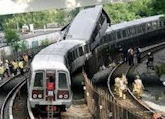The Silver Line extension of the Washington Metro might not open on time. The latest problem, according to Greater Greater Washington, is that the commuter rail system may not be able to hire, train and retain enough rail controllers to operate the system safely.
The Rail Operations Control Center (ROCC) oversees train movement on tracks. The center is critical to the safe operation of the rail system. In its most recent safety audit, the Washington Metrorail Safety Commission (WMSC) issued 21 findings requiring corrective action.
Metrorail has failed to follow its fatigue management policies that allow controllers at least one day off per week. Moreover, the control center is a toxic workplace.
The control center’s environment includes distractions, fear, threats and conflicting instructions that prevent overworked and undertrained controllers from fully and properly carrying out their duties. These serious safety concerns create a variety of safety risks for everyone who depends on Metrorail. …
Metrorail must address a toxic workplace culture in the ROCC that includes racial and sexual comments, harassment, and other unprofessional behavior such as attempts to manipulate safety event investigations that create unacceptable safety risks.
Repeated crashes and chronic delays have turned off thousands of Northern Virginians and other Washington-area riders. Even before the onset of the COVID-19 epidemic, ridership was down. Addressing safety and on-time performance issues has been a top priority of Metro management, yet a deeply rooted workplace culture has resisted change. The loss of fare revenue has aggravated Metro’s financial plight, increasing the likelihood that the Commonwealth of Virginia and Northern Virginia localities will have to cough up another round of subsidies.
After learning proper safety procedures in months of classroom training, ROCC controllers start their jobs only to receive conflicting direction from management to ignore those procedures, according to the audit. The conflict undermines morale and contributes to a high rate of staff turnover, contributing to staff shortages. Working longer hours and more days, controllers experience more fatigue, which harms morale, makes them more prone to errors, and… contributes to turnover.
In 2019, says the report, ““dysfunction in the ROCC during unplanned events and emergencies that includes yelling, conflicting instructions, and the failure to use checklists detracts from the ROCC’s ability to manage the rail system appropriately and effectively.”
No wonder, despite massive subsidies for Metro, so many Northern Virginians are sticking to their cars. Ironically, commuters using the Dulles Toll Roads are paying higher tolls to subsidize construction of Phase Two extension of the Silver Line to Loudoun County. Phase Two, which originally was expected to commence operations this year, now is scheduled for 2021.


Leave a Reply
You must be logged in to post a comment.